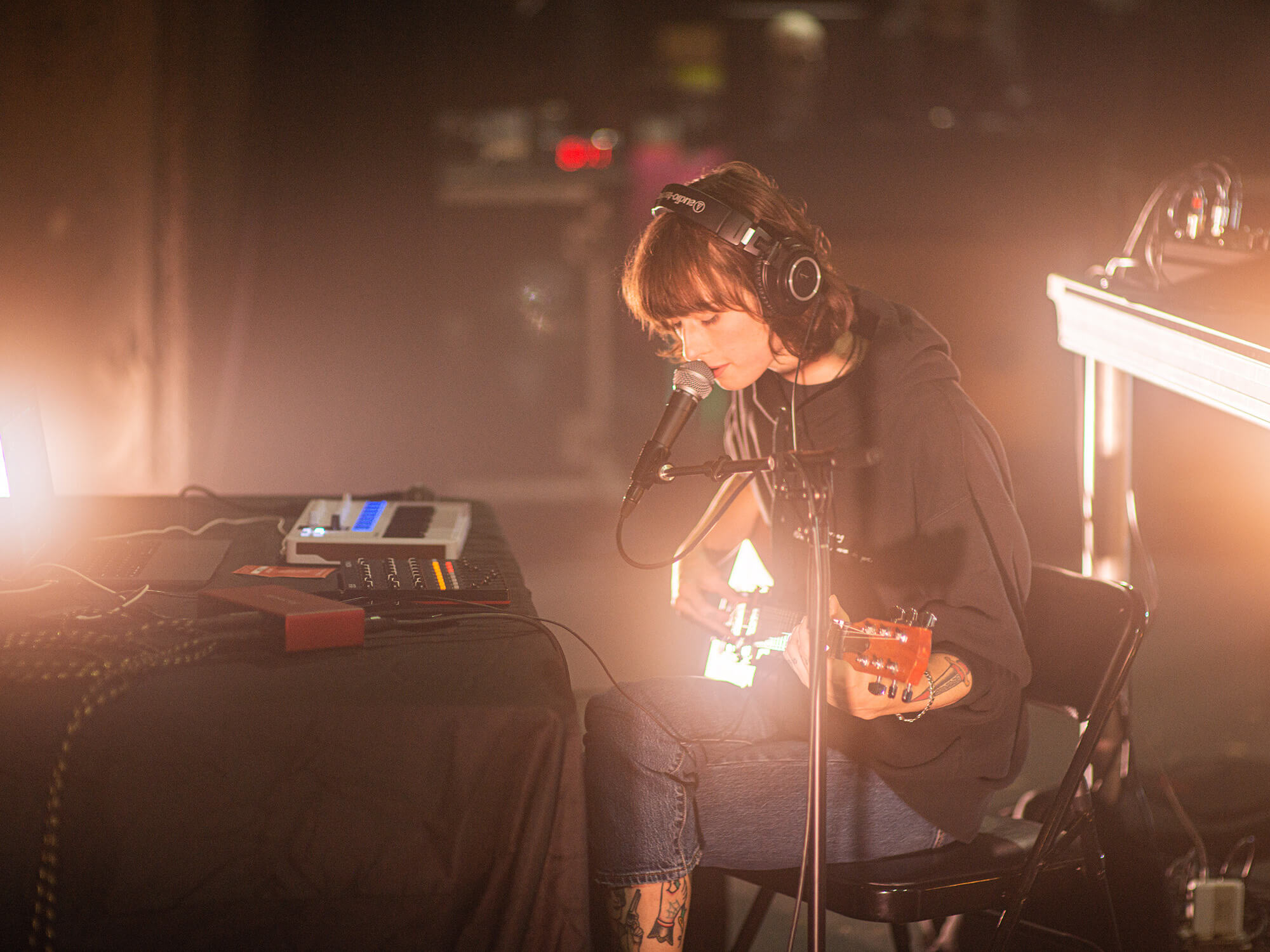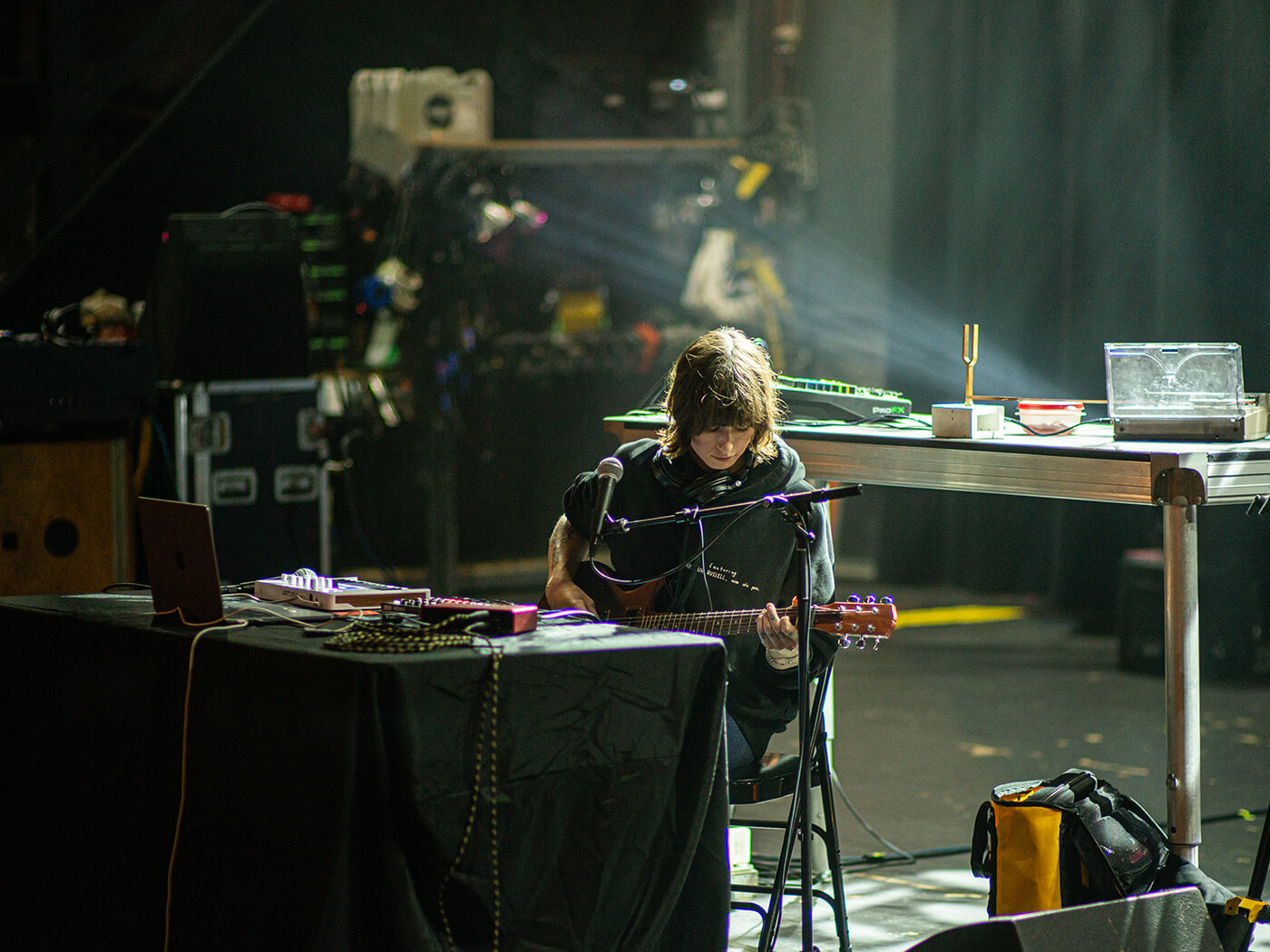Fight musique: claire rousay is making — and recording — the most of every moment
The “emo ambient” star tells us about life, death, auto-tune and her new album, sentiment

Image: Mike Boyd
Claire Rousay likes to get into fights. “If there’s a fight at a bar,” she says, “and you remove yourself from the bar while it’s happening, you’ll probably remember less about that night. But if you sit there and watch it, or get in the fight, you’ll definitely remember it.”
Rousay’s work is far from fight music. But that doesn’t mean it isn’t violent. Through fiercely emotional field recordings, drone flecked with found sounds and musique concrète spiked with blips and glitches, she elevates small moments to ruinous status.
“That’s the way I work: get really involved and put an emphasis on everything. Get the most I can in the moment.”
Her output is all about these moments. On the 2020 album it was always worth it, Rousay smoothes the rollercoaster textures of life into text-to-speech vocals assembled from messages exchanged over the course of a recently terminated relationship. On 2021’s 17 roles (all mapped out), clanging railway bells and barking dogs give way to a diary entry on self-doubt, loneliness and the afterlife. It’s almost too quiet to hear and too real to bear.
Speaking from her home studio in Los Angeles, Rousay is louder and quicker to laugh but every bit as candid. “You don’t want to get your hopes up for anything,” she says of her new album, sentiment. “But I’ve put the most work into this record of anything I’ve ever made.”
Rousay’s experimental recordings, released through Bandcamp with almost reckless abandon, have attracted high-profile subscribers. When Thrill Jockey founder Bettina Richards reached out to see if she wanted support from a label, the stage was set for her biggest album yet. “[Thrill Jockey] were open to anything,” says Rousay. What they got was her “‘song’ record”.

Fans of the musician’s more oblique works needn’t worry. sentiment has songs — real songs — but it’s no conventional pop coming-out. Its opener, 4pm, for example, is a spoken-word “letter to the universe, begging for the aching to let up”. It’s written by Rousay but voiced by someone else (Theodore Cale Schafer, one of multiple featured players from the Rousayverse), the first clue to the album’s depth and intertextuality.
From there, mournful strings and synths settle over sentiment like a heavy blanket; spare acoustic guitars rise like flowers erupting through concrete. And Rousay claws at the heartstrings with lines that are by turns soft, sensual and devastating. It’s all seasoned with street sounds, birdsong and snatches of conversation.
Rousay, who grew up an evangelical Christian and played in worship bands before abandoning religion, doesn’t make maudlin music. That would be old-fashioned. Instead, her work, which has been labelled “emo ambient” by fans and critics, feels sad in a thoroughly modern way. It acknowledges the promise and the lie of social media: connections made and connections missed. Her close-mic’d confessionals and themes of guilt, sex and anxiety are complemented by the sounds of iPhone message tones and keyboard clacks, rustling leaves and long showers, all of which contribute to a unique sense of millennial American malaise.
Within the melancholy, though, there are always moments of joy, of beauty, of uninhibited expression, of fucking around and finding out.
In 2022, Rousay and Mari Maurice, also known as More Eaze, released their fourth collaborative album, Never Stop Texting Me. Across its 10 electric power ballads, ambient minimalism and hyper-pop maximalism meet midwest emo, trap beats and auto-tune. It works.
“Mari and I made it and we were like, ‘This is the greatest record ever made!’ Then it came out and we looked back on it like, ‘That… that was a bold choice’.” Some critics agreed, calling the album a pastiche, as if its pop proclivities were a put-on (they weren’t) and its humour a defence mechanism to protect against criticism (it wasn’t).
“The way it was critiqued was not what we were expecting,” says Rousay. “We thought the influences would come out in the music, which didn’t happen. There’s a level of humour to it, for sure. Especially lyrically. But I think it’s pretty sincere. And pretty transparent. Talking about just wanting to be as famous as Kali Malone [we’re on that Kali Malone shit], that’s all anybody could want. That’s pretty sincere to me!”

The same sincerity and self-deprecation permeate sentiment. The album was already taking shape during the Never Stop Texting Me sessions. Some of its songs were even recorded then, while others are older still.
“It’s been a really, really long process,” says Rousay. “There’s nine or 10 versions of each of these songs. There’ll be songs that sound like Elliott Smith with panned acoustic guitars and double-tracked vocals or something, and then I’ll have the same song but there’ll be a fuzzed-out drum machine with a huge pad over the whole thing, and vocals that are panned all over the place.”
Break down these sessions, though, and you’ll see that many of them are made up of stock Ableton Live sounds. Rousay is fastidious when it comes to composition but less so when it comes to equipment.
“I’m just as happy running a $90 guitar direct into a Focusrite as I am playing a high-end Telecaster through a Vox and recording it with multiple mics.”
The electric guitar parts on sentiment were recorded using a Fender American Performer Telecaster. “I mostly just use that on everything. I use that recorded right into my interface and plated back through my ADAM A5X monitors and then recorded back with a Shure SM57. And that’s the guitar.”
Rousay’s refreshingly unfussy approach to gear is a reminder that emotional clarity is often best achieved through the simplest techniques. “I’ve always been down to play with whatever’s in front of me,” she says. “I’m just as happy running a $90 guitar direct into a Focusrite as I am playing a high-end Telecaster through a Vox and recording it with multiple mics.”
Still, like any musician, Rousay loves getting new toys. Whether through friend recommendations or brand hook-ups, new gear gracing her desk (or desktop) helps her break habits and shake up her routine. To put that bluntly: Claire loves free shit.
Her Tele came courtesy of Fender. She made 40 minutes of music within days of Hologram sending her its Microcosm loop pedal. And after Goodhertz furnished her with new plugins following a rec from friend and collaborator Meg Duffy (AKA Hand Habits), Rousay made them her core compositional tools. “All the Goodhertz plugins are really sick. So now I use them for everything.” That is, until the next new sound comes along.

Rousay is a sucker for VST string sounds and a big fan of Felt Instruments’ Blisko cello. She also recommends Spitfire Audio’s free LABS software instruments, especially its LA Atmos field recordings and textures. Can’t afford Native Instruments’ Una Corda? Just use the LABS Soft Piano, she says.
If there’s any sound that’s become synonymous with Rousay’s genre-fluid “emo ambient”, it’s auto-tune. “It’s the only thing I’ve ever paid for or researched,” she says.
The vocals on sentiment are smeared in Waves’ Tune Real-Time. In all its artificial warbling, Rousay’s voice is legion. Its many frequencies echo the desperation and mania of an Instagram comment section: thousands of voices fighting to be heard. But the effect is also a mask — artifice as armour. For a musician so willing to be vulnerable with her listeners, the cloaked voice is the last thing that separates claire rousay the artist from Claire Rousay the person.
The new album draws as much from Jimmy Eat World, Elliott Smith and Broken Social Scene as it does from Brian Eno. But beyond the emo, pop-punk and ambient touchstones, Rousay’s clearest influences are still, well, listen and you’ll hear it: everything else.
Rousay’s field recordings ramped up around lockdown. With the world in stasis, they were a way to recognise that life goes on even while we’re not looking – or listening. “Everything became a bit more interesting,” she says. “When you’re in the same space for a long time, you’re zooming in rather than looking outwards. I kind of zoomed in on my life. There is so much sound happening that I’m not making. The world is still moving even though it feels like it isn’t.”

Rousay leaves her Zoom H5 recorder running for hours at a time, chronicling everything and nothing. In her kitchen. In Ubers. In hotel rooms around the world. On afternoon walks in the park with her dog, Luna. At restaurants with her friends. Anywhere and everywhere. With so much raw audio on her hands, she’s had to become adept at finding moments of value.
“I’ll drag a file into Ableton to see it visually,” she says. “I’m just looking for activity within the waveforms. Like, something happened here, because the signalling changed. There’s obviously a reason for that. I’m interested in that reason. Something is happening and I need to get it out. I guess that’s important to me.”
Rousay isn’t an archivist. Her compulsive field recording isn’t an exercise in nostalgia stockpiling. She won’t revisit these files in the future. In fact, she’s deleted more gigabytes of recordings than most musicians have ever made. It’s not about being able to access the past from the future. It’s about the present. It’s about getting in the fight. Getting the most in the moment. Not to be all sentimental about it, but these moments matter.
“I don’t expect that I’m going to live for a very long time,” says Claire. “I don’t know where that fear comes from. I don’t even know if it’s necessarily a fear. I think it’s just an intuitive thing. But something about recording and deleting things is maybe tied up in that – how things aren’t permanent but they are important.”
‘sentiment’ is released on Thrill Jockey on April 19